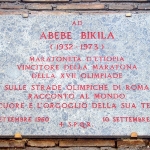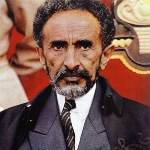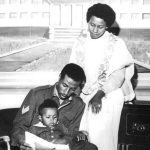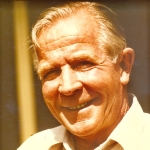Background
Abebe Bikila, in full Shambel Abebe Bikila, was born on August 7, 1932, in Jato village, near Mendida town, Ethiopian Empire (present-day Ethiopia). He was the son of Bikila Demissie, a shepherd, and Wudinesh Beneberu.


1964
Tokyo, Japan
Gold medalist Abebe Bikila (center), silver medalist Basil Heatley (left) of Great Britain and bronze medalist Kokichi Tsuburaya (right) of Japan pose for photographs on the podium after the Men's Marathon during the Tokyo Olympic at the National Stadium, Japan. Photo by The Asahi Shimbun.
1960
Rome, Italy
Abebe Bikila (front) on his way to winning his first Olympic gold medal in the marathon race. Photo by Popperfoto.
1960
Rome, Italy
Bikila Abebe with his first Olympic gold medal after winning the marathon at the Olympics in Rome, in the company of Abdeslon Rhadi of Morocco (left), silver medalist, and Barry Magee of New Zealand, bronze medalist. Photo by Central Press/Hulton Archive.
1960
Rome, Italy
Abebe Bikila running during the marathon at the Olympics. Photo by Bettmann.
1960
Rome, Italy
Abebe Bikila raising his arms to the sky during the marathon prize-giving ceremony at Rome Olympics. Photo by Angelo Cozzi; Mario De Biasi; Sergio Del Grande; Walter Mori/Mondadori.
1960
Rome, Italy
Abebe Bikila rejoicing as he is the gold medal winner in the marathon. Photo by Angelo Cozzi; Mario De Biasi; Sergio Del Grande/Mondadori.
1960
Addis Abeba, Ethiopia
Rome Olympic marathon gold medalist Abebe Bikila warms up during a training session in Addis Abeba, Ethiopia. Photo by The Asahi Shimbun.
1960
Addis Abeba, Ethiopia
Abebe Bikila, Rome Olympic marathon gold medalist, is seen during a training session in Addis Abeba, Ethiopia. Photo by The Asahi Shimbun.
1960
Rome, Italy
Abebe Bikila at the finish line during the Rome Olympic Games. Photo by Keystone-France/Gamma-Keystone.
1960
Abebe Bikila is presented with the Order of the Star of Ethiopia by Emperor Haile Selassie in the Green Salon of the Emperor's palace.
1960
Rome, Italy
Abebe Bikila and his coach Onni Niskanen. Photo by RDB/ullstein bild.
1960
Addis Ababa, Ethiopia
Crown Prince Akihito and Crown Princess Michiko talk with Abebe Bikila in Addis Ababa, Ethiopia. Photo by The Asahi Shimbun.
1960
Addis Ababa, Ethiopia
Crown Prince Akihito shakes hands with Abebe Bikila during the reception at the official residence of the Japanese Ambassador to Ethiopia in Addis Ababa, Ethiopia. Photo by The Asahi Shimbun.
1961
Kosice, Czech Republic
Abebe Bikila is seen entering the stadium to win the 31st annual Peace Marathon at Kosice, Czech Republic. Photo by Allsport Hulton/Archive.
1961
Tokyo, Japan
Abebe Bikila (right) and Wami Biratu (left) of Ethiopia in training ahead of Mainichi Marathon at the National Stadium, Tokyo, Japan. Photo by The Asahi Shimbun.
1963
Boston, Massachusetts, United States
Abebe Bikila and his teammate Mano Wolde (#6) at the 19th Boston Marathon.
1963
Boston, Massachusetts, United States
Abebe Bikila and his teammate Mano Wolde (#6) at the 19th Boston Marathon.
1963
Boston, Massachusetts, United States
(From left to right) Abebe Bikila and his compatriot Mamo Wolde competing in the Boston Marathon. Photo by Ted Russell/The LIFE Images Collection.
1964
Tokyo, Japan
Abebe Bikila crosses the finish line in first place to win the gold medal in the men's marathon event in a world record time during the Summer Olympics inside the Olympic stadium in Tokyo, Japan. Photo by Rolls Press/Popperfoto.
1964
Tokyo, Japan
Abebe Bikila in training for the Olympics in Tokyo with his marathon teammate Mamo Wolde. Photo by Central Press.
1964
Tokyo, Japan
Abebe Bikila competes in the Men's Marathon during Tokyo Olympics at the National Stadium, Japan. Photo by The Asahi Shimbun.
1964
Tokyo, Japan
Gold medalist Abebe Bikila (center), silver medalist Basil Heatley (left) of Great Britain and bronze medalist Kokichi Tsuburaya (right) of Japan pose for photographs on the podium after the Men's Marathon during the Tokyo Olympic at the National Stadium, Japan. Photo by The Asahi Shimbun.
1964
Tokyo, Japan
Abebe Bikila with an Ethiopian flag at the flag-raising ceremony held in Olympic Village, Tokyo, Japan. Photo by Keystone-France/Gamma-Rapho.
1964
Tokyo, Japan
Abebe Bikila (2nd left) competes with Kokichi Tsuburaya (left) of Japan in the men's marathon during the Tokyo Olympics. Photo by Sankei Archive.
1964
Tokyo, Japan
Abebe Bikila (1st left) competes in the men's marathon during the Tokyo Olympic Games. Photo by The Asahi Shimbun.
1964
Tokyo, Japan
Abebe Bikila (right) in training during the Tokyo Olympic Games, Tokyo, Japan. Photo by The Asahi Shimbun.
1964
Tokyo, Japan
Abebe Bikila in training ahead of the Tokyo Olympic Games at the Athletes' Village, Tokyo, Japan. Photo by The Asahi Shimbun.
1968
Mexico City, Mexico
Abebe Bikila competes in the Men's marathon at the Summer Olympics in Mexico City, Mexico. Photo by Rolls Press/Popperfoto.
1970
Guttmann Rd, Aylesbury HP21 9PP, United Kingdom
Abebe Bikila practices archery from his wheelchair in preparation for the International Paraplegic Games held at Stoke Mandeville Stadium in Aylesbury, Buckinghamshire. Photo by Roger Jackson/Central Press.
1972
Abebe Bikila as a guest of the 'Aktion Wiedersehen' in Munich, an organization working to enable former athletes to be present at the Olympic Games as spectators. Photo by Keystone.
Olympischer Platz 3, 14053 Berlin, Germany
Abebe Bikila (left) and Mamo Wolde (right) during exhibition race at Berlin Olympic Stadium. Photo by Robert Lackenbach/The LIFE Picture Collection.
Tokyo, Japan
Bikila Abebe gets an Olympic gold medal as the winner of the marathon.
Rome, Italy
A plaque on the wall of the Via di San Gregorio, Rome, commemorating the 50th anniversary of Abebe Bikila's first Olympic victory.
Tokyo, Japan
Abebe Bikila has a blood type test at the Athletes' Village ahead of the Tokyo Olympic Games, Tokyo, Japan. Photo by The Asahi Shimbun.

































አበበ ቢቂላ
Abebe Bikila, in full Shambel Abebe Bikila, was born on August 7, 1932, in Jato village, near Mendida town, Ethiopian Empire (present-day Ethiopia). He was the son of Bikila Demissie, a shepherd, and Wudinesh Beneberu.
Born in the year of the Los Angeles Olympic Marathon, Abebe Bikila was raised on a farm where his father was a shepherd. At the outbreak of the Second Italo-Ethiopian War, his family relocated to the town of Gorro. It was then that Bikila's mother parted ways with her husband and Bikila's father and remarried a man named Temtime Kefelew. The family later came back to Bikila's native place, Jato. Running around his village as well as playing Yegena Chewata or gena, an Ethiopian variation of traditional hockey where goalposts are placed on a long-distance, were among Abebe's favorite pastimes.
Aged about twenty, Bikila was drafted to the 5th Infantry Regiment of the Imperial Guard where he soon became one of Haile Selassie's, the Emperor of Ethiopia, personal bodyguards. As part of his training, he was sent to a camp that the government had set up after World War II. Bikila's talent in running was noted by a Swedish coach, Onni Niskanen, who organized heavy workouts for Bikila and the others in the 6,000-foot-high mountains. Running barefoot over the tough, rocky soil was common.
The start of Abebe Bikila's athletic career can be counted from July 1960 when he won his first marathon in the capital of Ethiopia, Addis Ababa. An athlete from an isolated country with closed borders and whose winning time wasn't particularly impressive, compared to other runners, didn't receive much attention from people outside. Yet, Bikila bested his result in his second marathon, again held in Addis Ababa in August. His improved winning time was dramatic, as was the fact that both races were run at a high altitude and he had won them only a month apart, with little rest in between. The Olympic marathon that would take place that same year, in Rome, was his next goal.
For the first time in history, that race was organized outside the Olympic Stadium and for the first time ever it was held at night. Bikila was far from being the favorite of the event, contrary to his rivals, in particular, Sergei Popov of the Soviet Union, a holder of the world record. Abebe would probably not have been noticed at all were it not for the fact that he chose to overcome the entire distance of 26.2 miles without running shoes.
At 18 miles, Bikila was still battling one of his competitors, Rhadi of Morocco, for the lead. Slightly over than a mile from the finish, he accelerated so strongly that Rhadi could no longer keep up. He beat Rhadi by 25 seconds, making the distance in 2:15:16.2. With this time, Abebe Bikila won the gold medal, surpassed Popov's previous world record by eight tenths of a second, and beat the Olympic record for the marathon by almost 8 seconds.
Bikila gained instant popularity worldwide and became known as the Ethiopian who had conquered Rome. In 1961, he triumphed in marathon races in Greece, Japan, and Czechoslovakia (present-day territory of Czech Republic and Slovakia). Still holding the world record, he returned to his home country in October and didn't participate in international competitions for two years.
After finishing fifth in the 1963 Boston Marathon, Bikila went back to his army job in Ethiopia, disappearing from the international view once again. There were talks that the marathon star competed in his native country or that he had been sent to the Somali border with Ethiopia because of tensions between the two countries. Bikila resumed competition in 1964 by winning a marathon in Addis Ababa, with a time of 2:23:14. A year later, on August 3, he easily passed his rivals, both compatriots Mamo Wolde and Demissie Wolde, in the Ethiopian Olympic trials with an incredible time of 2:16:18.
Bikila was forced to skip preparatory training for the 1964 Tokyo Olympics because of the surgery for appendicitis that he had six weeks before the event. Yet, he took his place at the start, this time wearing shoes. Staying with the lead runners until the 12-mile mark, he then moved to the front. Not expected to finish first because of his surgery, Bikila was however in the lead by five seconds at the halfway point. At 22 miles, he was two and a half miles ahead of the nearest competitor and won, setting a new record of 2:12:11.
The Olympic triumph was followed by three victorious marathons in 1965 and 1966. Bikila competed in his next and last Olympics, held in Mexico City this time, still nursing a stress fracture in his foot. As always, the Ethiopian legend started out in the lead pack but had to withdraw from the race in the tenth mile.
Abebe Bikila then returned to his service in the Imperial Guard and was promoted to captain by Emperor Selassie. In 1969, Bikila was seriously injured in a car accident in Addis Ababa and remained paraplegic from the waist down for the rest of his life. Although he couldn't walk anymore, Bikila came back to sport focusing on archery. He participated in archery and table tennis at the 1970 International Wheelchair and Amputee Sports World Games in London, a precursor of the Paralympic Games. A year later, Bikila had a victory at the cross-country sleigh-riding event in a competition for the handicapped held in Norway.
In 1972, the legendary runner was invited to the Munich Olympic Games as a special guest. Sitting in his wheelchair, he watched American Frank Shorter win the marathon.

Abebe Bikila is rightly considered one of the best long-distance runners all over the world. The first black African to grab the highest Olympic title and the first man ever to win an Olympic marathon twice, Bikila, along with another African legendary runner Rhadi Ben Abdesselam, paved the way for a new era in international competition, in which African athletes would come to dominate distance running.
Bikila won twelve of the total of sixteen marathons in which he competed during his career. He was and remains a national hero for the people of Ethiopia. He was given a state funeral with full honors. The ceremony was attended by 65,000 people and was followed by a national day of mourning proclaimed by Haile Selassie.
The Ethiopian legend continues to inspire so many athletes around the world. The Abebe Bikila Award was established by the New York Road Runners in 1978 to commemorate the best stayers. Mamo Wolde, Juma Ikangaa, Tegla Loroupe, Paul Tergat, and Haile Gebrselassie are among the East African recipients of the accolade.
There is a stadium in Addis Ababa and the American Community School of Addis Ababa gymnasium named after Bikila. A plaque commemorating Bikila was placed on the wall of the Via di San Gregorio, Rome, in 2010 on the occasion of the 50th anniversary of his first Olympic victory.
Abebe Bikila's triumph at the 1964 Olympic Games in Tokyo was featured in Kon Ichikawa's documentary Tokyo Olympiad. The pieces from the documentary were used by John Schlesinger in his 1976 thriller, Marathon Man, starring Dustin Hoffman. The Ethiopian legend is also a central character of a 2009 feature movie, Atletu (The Athlete), directed by Davey Frankel and Rasselas Lakew.
Quotations:
"Men of success meet with tragedy. It was the will of God that I won the Olympics, and it was the will of God that I met with my accident. I accepted those victories as I accepted this tragedy. I have to accept both circumstances as facts of life and live happily."
"I wanted the world to know that my country Ethiopia has always won with determination and heroism."
Physical Characteristics: Abebe Bikila was 1.77 meters tall. He underwent an appendectomy about two months before his second Olympic Games in 1964. The car accident he survived in 1969 made him paralyzed below the waist.
Quotes from others about the person
Richard Benyo, journalist and veteran distance runner: "His running is seemingly effortless; he is frail but incredibly strong. He is like a personification of everything the marathon runner should be. He is the most natural world-class runner anyone has ever seen."
Charlie Lovett, writer, novelist: "For Bikila, no more strategy was necessary. He slowly increased his lead, running with total concentration and precision – the ultimate image of the perfect marathoner. There was no indication that either his surgery or the extreme humidity was having the slightest effect on his race. His body seemed to float down the streets. Niskanen had taught him how to run using the least amount of energy and Bikila's smooth strides and motionless head made the race appear effortless."
Abebe Bikila married 15-year-old Yewebdar Wolde-Giorghis on March 16, 1960. Arranged by his mother, the marriage lasted till the end of Bikila's life. The family produced four children.

(born July 23, 1892 – October 25, 1973)
Selassie was an Ethiopian Emperor who ruled the country from 1930 to 1974. He sought to modernize the country and pursued the post-World War II African policies. He brought Ethiopia into the League of Nations and the United Nations and made Addis Ababa the major centre for the Organization of African Unity (present-day African Union).

(born 1945)

(born August 31, 1910 – died March 20, 1984)
Onni Niskanen, in full Onni Herman Niskanen, was the Ethiopian Imperial Guard Swedish trainer.
